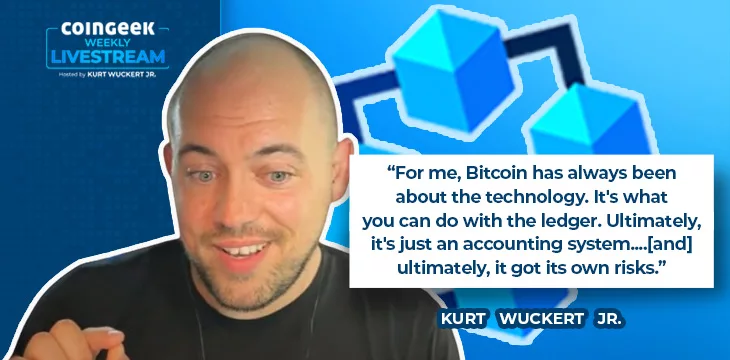
|
Getting your Trinity Audio player ready... |
On episode 10 of the CoinGeek Weekly Livestream season 4, Kurt Wuckert Jr. answered viewer questions about blockchain technology. He covered the recent price rally, the latest happenings in the BSV blockchain, progress with Teranode, and much more.
We may be in a bull market, but be careful
Wuckert kicks things off by addressing a question about the recent increase in coin prices. He says we might be in a bull market, and if we finish the week with a green candle, we likely will be. However, it could be a triple top, and that’s bearish.
In any case, he warns viewers who want to speculate to do so with beer money and not with rent money. Bitcoin is an accounting system, he says. It’s not an investment.
Can you explain how Tether pumps are related to BTC price rises?
Understanding Tether requires an understanding of fractional reserve banking. It has everything people dislike about it combined with the worst of corporate corruption.
This offshore stablecoin company can mint $10 billion and claim it is backed by actual dollars or equivalents, but it has never submitted to a formal audit. It’s also unclear why people would trust this company with such large sums when coins can be bought for fiat.
We know for sure Tether is running a fractional reserve system. They’ve been caught lying about reserves before and were even banned from operating in New York State. They make money by pumping the price of BTC with USDT and then selling it once retail enters with real money. Is Tether a scam? Someday, we’ll find out for sure, but it’s definitely shady.
What will the outcome of COPA v Wright be?
Wuckert reminds us that not all witness statements are publicly available. Lots of stuff is also redacted. There’s also a lot of uncontested evidence, and we’ve only seen the stuff that’s disputed in the public trial. Thus, the public trial may be very different from how the judge sees it.
Based on the public trial, Wuckert doesn’t think either side delivered a knockout punch. However, he emphasizes that we haven’t seen all the evidence, and it will be up to the judge to determine the truth.
What are your thoughts on the halving and the future of transaction processors?
Wuckert has seen three halvings in his Bitcoin mining career. In the previous two, hash power followed price. However, this time, hash power continued to climb during the bear market, which was unprecedented.
This increase in hash power increases the difficulty and reduces profitability for many miners. That profitability will soon be reduced even further when the next halving occurs. Transaction fees could increase to cover them, but they’re already high at times due to all the on-chain activity.
BSV is the opposite; we need more transactions, but blocks can keep getting bigger, so the economics work out long-term. Wuckert uses an analogy he has used before: BTC is catering to a small niche of wealthy clients, much like a high-end restaurant does, while BSV aims to be McDonald’s, serving everyone all over the world. In the end, McDonalds is the better business model.
Are music artists doing audio NFTs using 1Sat Ordinals?
“Not quite yet,” Wuckert says. There’s a rumor that one great music tokenization platform will be revamped and relaunched. Music on 1Sat Ordinals would work fine, he says, and they’re highly programmable. Better yet, developers from other chains like Dogecoin can understand them easily and quickly get involved.
What is POW-20?
These are tokens distributed by proof-of-work. Unlike others where you simply generate tokens or buy them, these are distributed for work done using CPU/GPU/ASICs. DOTI is the first of this kind of token.
How can BTC miners survive in the long run? Will fees be $500-$1,000?
That’s what they’re shooting for, Wuckert tells us. They openly admit that ordinary people will be priced out of the base layer and will use L2s. However, a working L2 has not yet been found—the Lightning Network isn’t a viable solution. Of course, the other way is terabyte blocks full of microtransactions, but small blockers don’t want to hear about that.
Other than Teranode, what’s the most intriguing thing happening in the BSV blockchain?
Everything to do with tokens, Wuckert says enthusiastically. He once wrote a paper on the tokenization of everything. When he encountered Bitcoin, he realized it could allow us to trade in any tokenized commodity globally in a peer-to-peer manner.
To hear more about RUN NFTs, mining with GorillaPool, how SPV works, and whether Satoshi coins are on the move, check out the livestream via this link.
Watch: The Future Internet—Uniting Blockchain, AI & IPv6

 11-21-2024
11-21-2024


